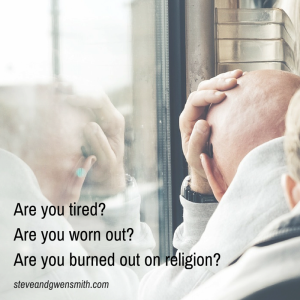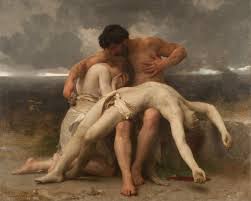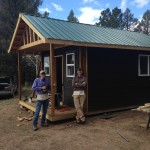By Stephen W. Smith

This post is my attempt to try to define what "faith" means. The foundation for this post is the ladder that Peter describes that followers of Jesus should ascend in life to rise above the brokenness of the world; the collapse of our values; the implosion of ethics and the competing religions of our day. To put this in context, read Peter's words here, then go on to read the blog entry:
"So don’t lose a minute in building on what you’ve been given, complementing your basic faith with good character, spiritual understanding, alert discipline, passionate patience, reverent wonder, warm friendliness, and generous love, each dimension fitting into and developing the others. With these qualities active and growing in your lives, no grass will grow under your feet, no day will pass without its reward as you mature in your experience of our Master Jesus. Without these qualities you can’t see what’s right before you, oblivious that your old sinful life has been wiped off the books."--2 Peter 1:5-7.
My intent here is to redefine each of Peter's 8 virtues so needed today.
The first is faith.
Peter’s first rung on the ladder we are to ascend is faith. Currently there are over 44,000 different Christian denominations all trying to define what “faith” means. There are various creeds and doctrines all seeking to say what is absolutely essential to believe. It’s embarrassing and humbling to realize that there are so many schisms, splinters and sects all fiercely holding to their own version of what faith really means.
Even here, I will perhaps please some and perhaps offend all, but let me try to explain what I believe Peter intended. First, it may come as a shock to you to read here that Jesus Christ was not a Christian. It’s clear from reading the four eye witness accounts of Jesus life and teachings, that Jesus Christ never intended to begin a new religion. He came to begin a new way of life.
His first followers were never called Christians either. They were all called, “followers of the way.” The way Jesus signaled to walk was a way that was far, far different from the rival religions of his day. Jesus, as the leader of this new way called for people to follow him in this new way of life and living. He mentored those who he called to follow him. They spent time with him. Through spending time together, they learned how radically different the way of Jesus actually was. It was a way that would require them to embrace a Kingdom view of life—not just follow a list of rules and regulations.
Jesus never called people to embrace Christianity as we know it today. He called people to walk in a brand new way of life that would be radical; consuming and risky. It was not a way to be comfortable but a way to make the comfortable uncomfortable by making radical calls about their possessions, relationships and ethics.
Since Peter was one of the first people that Jesus called into this new way of living, Peter knew and understood quite well that to be a follower of Jesus was to be a person of faith that trusted Jesus, followed Jesus and one that would attempt to live like Jesus. This way involved the formation of a character, conscience and faith that would be like the founder’s—Jesus.
To be a follower of Jesus did not mean so much a list of beliefs as we have wrongly assumed today. To follow Jesus meant the transformation of one’s character, ethics, way of thinking; values and life’s goals. This is the faith—Peter is calling us to have.
The “faith” that Peter is saying that is so very foundational is about a way of life not a list of doctrines and dogma. Peter really had no doctrines, nor did Paul in the early beginnings of the history of the Christian church. There was no list of beliefs; no doctrinal statements that the thief on the cross who was crucified with Jesus had to sign off on. It was simply a way—a way of life characterized by being reconciled with God; reconciled with one another in a new way of relating that was based on love and most importantly—that this new way become THE way that the global community should embrace and attempt to walk in this way.
Let me be clear. This history of what has happened on this way and to this way that Jesus first so clearly defined and unpackaged for us has become cloudy, murky and unattractive. How could Peter who first encountered Jesus naked in a fishing boat come to wear the garb of a pope? How could the early followers of Jesus who huddled first in homes morph into mega-churches today? How could such a simple, yet radical “way of life” become something churches fight over and within the walls of our own churches disagree so much about today? How could the American church keep quiet about the Holocaust in World War II and how could the world wide church be so silent about the atrocities done to innocent Rwandans in the Clinton presidency? How could denominations squabble over so little when our world seems bent on sliding into the abyss of a hell-like state. There are many, many questions to our sad and fragile history and most of the questions expose our ineptness in truly getting what Jesus must have intended. But this does not mean that we throw the baby out with the bath—so to speak.
The way of life—the way Peter was called to walk by Jesus is the same way that you and I are called to follow. Peter never meant the faith in a list of doctrines to be our foundation in life. He never meant a creed to be our cement. The faith Peter describes is the faith he must have recalled he had to exercise when Jesus himself, called him to leave a boat intended to fish for mere fish—only now to be one who would walk in the very way that the founder walked in. This way for Peter actually meant to die a death like his founder in that Peter met his death being also crucified but reported to have been nailed to a cross up-side down—an act of total humiliation and retribution. We walk this way, step by step—the exact steps that Peter described earlier in this first epistle when he said, “This is the kind of life you’ve been invited into, the kind of life Christ lived. He suffered everything that came his way so you would know that it could be done, and also know how to do it, step-by-step.” Pete’s “step-by-step” way was what he was referring to in his rungs on the ladder he now describes in the passage we are working through here.
This “faith” is more action than belief; more movement than institution; more passion than liturgy; more personal than corporate; more a way than a membership in a church; more a ethos than a church.
This is the exact “faith” that is needed to re-define success. It is this faith that shapes one’s legacy. It is this faith that keeps one from perpetually chasing the bitch-goddess of success.
This DNA kind of faith is what is essential to living above the white-water of competing morals and shouts from the masses to go along with the crowd and do what others are doing. It is this precise kind of faith that gives one the “gravitas” to stand firm; to perhaps stand tall in the minority and to stand firm in the mudslide of 21st century implosion of values. This “faith” is what is absolutely foundational to both our well-being and any attempt we have to have an impact on the plethora of other ways we are faced with to live; to do business; to do church and to truly follow the way of Jesus.
Copyright 2013. Stephen W. Smith. All Rights Reserved. This material is a part of a forth coming book written by Stephen W. Smith.
I invite your comments, reactions and recommendations~








 Never before in my life, have I personally witnessed so much despair in the lives of so many people. The economy has been depressed and depressing for five long years now. It seems so many wonderful people are struggling on a daily basis to keep their head above water. Most are struggling. Many are stumbling. Collectively, we are surviving but few could honestly say they are thriving. We are still in a war. Politics offers few answers and little hope. And then there's the church which pretends as if nothing is really wrong and holds to sameness, gripping its collective fear of change and moving ever so close to the cliff of no return.Five years ago this week I led a retreat for white collar workers in Denver. I asked the question, “How many of you are living with more fear in your life than at any other time?” Every hand was raised. Today, as I travel, speak and work one on one with leaders both in the market place and the ministry, fear is the predominate descriptor of emotion that most people I work with are expressing. Truly, we are living in a most sobering time--a season calling for deep searching and few answers. It doesn't matter if we are white collar or blue. Democrat or Republican-- American or African---we are quivering in our boots in an unparalleled season of floundering without breakthrough and endurance rather than hope.Allow me to be honest and transparent. All of this takes a tremendous toil on a small ministry where we seek to raise our support year after year to be a resource to leaders both in the business world and ministry sphere who themselves are struggling. I have my own questions. Can we survive? Will we make it? Is there something--anything I can possibly do that would help?We are in “it” together. We are waiting for a better time. We are hoping to turn the corner to a time when so much struggling, work and effort to stay alive, sustain our lives and experience a fulfillment of a dream, a hope and a vision.Friends, this is precisely what “ADVENT” is all about. Advent is a season of expectant waiting for something to happen that will turn the table and improve our most desperate situation. Most followers of Jesus wrongly assume that being saved is a once in a life-time event. But life teaches us that we need to be saved from MORE than just our sins. We need to be saved from despair. We need to be saved from coming unglued. We need to be saved from merely surviving to experiencing a robust sanity in life.The coming four weeks of Advent are weeks to move away from the commercialization and sick emphasis on materialism as the answer to our dilemma. Advent is the intentional waiting on God to show up and do something about our sick condition. Many followers of Jesus are unaware of the practice of Advent. We’re throw the baby of this important season out with the water to be relevant and “seeker friendly.” In doing so, we have found ourselves more caught up than ever before in Black Friday, Cyber Monday and Depressing December year-ends.
Never before in my life, have I personally witnessed so much despair in the lives of so many people. The economy has been depressed and depressing for five long years now. It seems so many wonderful people are struggling on a daily basis to keep their head above water. Most are struggling. Many are stumbling. Collectively, we are surviving but few could honestly say they are thriving. We are still in a war. Politics offers few answers and little hope. And then there's the church which pretends as if nothing is really wrong and holds to sameness, gripping its collective fear of change and moving ever so close to the cliff of no return.Five years ago this week I led a retreat for white collar workers in Denver. I asked the question, “How many of you are living with more fear in your life than at any other time?” Every hand was raised. Today, as I travel, speak and work one on one with leaders both in the market place and the ministry, fear is the predominate descriptor of emotion that most people I work with are expressing. Truly, we are living in a most sobering time--a season calling for deep searching and few answers. It doesn't matter if we are white collar or blue. Democrat or Republican-- American or African---we are quivering in our boots in an unparalleled season of floundering without breakthrough and endurance rather than hope.Allow me to be honest and transparent. All of this takes a tremendous toil on a small ministry where we seek to raise our support year after year to be a resource to leaders both in the business world and ministry sphere who themselves are struggling. I have my own questions. Can we survive? Will we make it? Is there something--anything I can possibly do that would help?We are in “it” together. We are waiting for a better time. We are hoping to turn the corner to a time when so much struggling, work and effort to stay alive, sustain our lives and experience a fulfillment of a dream, a hope and a vision.Friends, this is precisely what “ADVENT” is all about. Advent is a season of expectant waiting for something to happen that will turn the table and improve our most desperate situation. Most followers of Jesus wrongly assume that being saved is a once in a life-time event. But life teaches us that we need to be saved from MORE than just our sins. We need to be saved from despair. We need to be saved from coming unglued. We need to be saved from merely surviving to experiencing a robust sanity in life.The coming four weeks of Advent are weeks to move away from the commercialization and sick emphasis on materialism as the answer to our dilemma. Advent is the intentional waiting on God to show up and do something about our sick condition. Many followers of Jesus are unaware of the practice of Advent. We’re throw the baby of this important season out with the water to be relevant and “seeker friendly.” In doing so, we have found ourselves more caught up than ever before in Black Friday, Cyber Monday and Depressing December year-ends.  Returning to Advent is the beginning of a new way to look at life. Take each week and simply light a candle each Sunday marking the long, awaited wait for the Day that God will finally appear. Each week, watch your mantel, coffee table or dining table grow brighter and brighter with light. Isn’t that what we want—more light; more hope; more progress. The candles of Advent literally show us the way forward through the long, dismal season of darkness. Here’s a link to one of the best resources I am aware of that helps us embrace not scorn this important season:
Returning to Advent is the beginning of a new way to look at life. Take each week and simply light a candle each Sunday marking the long, awaited wait for the Day that God will finally appear. Each week, watch your mantel, coffee table or dining table grow brighter and brighter with light. Isn’t that what we want—more light; more hope; more progress. The candles of Advent literally show us the way forward through the long, dismal season of darkness. Here’s a link to one of the best resources I am aware of that helps us embrace not scorn this important season: 
